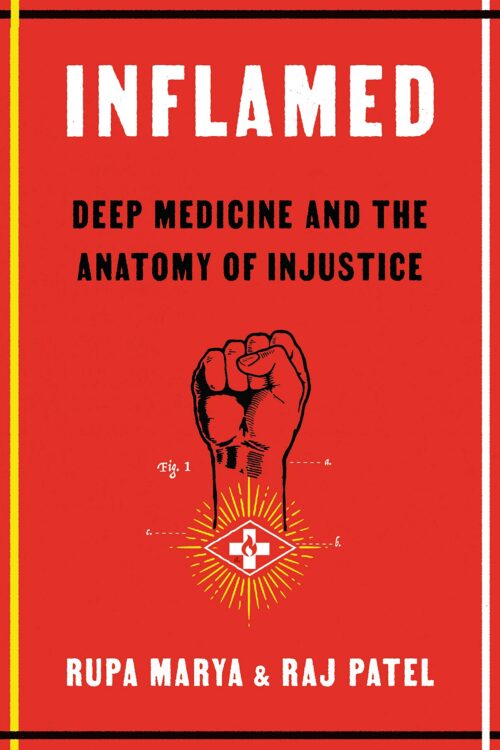Inflammation, The Root Of Disease, In Humans And The Earth: A Colonization Legacy And The Hope of “Deep Medicine”
KEY POINTS
- The inflammation in our bodies is intricately linked to the disordered systems we experience.
- “Deep medicine” rebalances bodies and the systems they interact with.
- Health requires us to reweave ourselves back into symbiosis with each other and the environment.
Physician Rupa Marya and author Raj Patel inform us that our bodies are inflamed. Even if we have not yet noticed, we are all likely to succumb to a disease caused by inflammation. Inflammation in our bodies is triggered when cells or tissues are damaged or threatened with damage. According to their new book, Inflamed: Deep Medicine and the Anatomy of Injustice, we are living in an inflammation-generating system.
The “exposome” is a scientific term denoting all the environmental exposures a body has sustained. The authors describe it as representing “the sum of lifetime exposures to nongenetic drivers of health and illness, from conception to death” (p. 32). In industrialized nations where the exposome is rife with triggers for disease, those who are poor or members of minority groups tend to suffer greater biological, chemical, social, ecological, historical, political and psychological disadvantages that lead to more pro-inflammatory exposomes.
But it is not just our bodies that are inflamed, the authors contend; so is our society and planet. “We become inflamed when we are in abusive relationships with our soils, our rivers, our microbial passengers, our animal and plant relatives, our air, and each other” (p. 349). Thus, inflammation is systemic—including ecological, biological, social, psychological, and economic systems—all those created by the organization of the modern world.
Predominant diseases in our bodies today are caused by runaway inflammation in larger systems, in interactive cycles that disrupt our bodies’ systems. For example, there are over 144,000 recently created human-made chemicals in the world. Our bodies are not designed for this resulting daily onslaught of non-natural chemicals. Most are not regulated, and only after considerable havoc is wreaked and public awareness raised, are regulations set up (think DDT).
The authors contend that our ill health is related to systemic racism and runaway global capitalism based in a colonial worldview. The colonization worldview separates individual bodies from their social and historical context, often ignoring the health of the web of life supporting the individual.
Colonialism, observe the authors, involves more than taking over the land and resources of invaded places. It is a holistic extinguishing of one cosmology, or worldview, with another, altering patterns of relationships, language, identity, community and care. Colonialism has altered relationships to knowing, understanding, connecting to the natural world and to the past.
The authors, one a medical doctor, point out that the history of modern medicine is the history of colonialism. Modern medical training teaches practitioners to be technicians more than healers, treating a patient as an isolated individual, like a machine, shorn of history and complexity.
They advocate for a “deep medicine,” an approach that is focused on balancing the complex, interacting systems of bodies and ecologies. “Indigenous people have known for thousands of years what modern science is just beginning to understand: that good health is all about relationships and living with others in harmony” whether people, germs, forests, bacteria (p. 134), whereas colonialism’s “long war of sanitation—a war against life in all its complexity…has brought the loss of biodiversity and knowledge, particularly women’s traditional knowledge of seeds, life, health, and the multitude of interactions within the web of life” (p. 139).
Deep medicine is about rehumanizing our systems and our relationships with one other, including with the more than human. “Our bodies have evolved in systems of deep relationships with the sun, soil, water, tides, seasons, archaea, bacteria, viruses, animals, plants, fungi, and the rest of the teeming world. Each of those depends on relationships with one another. The study of ecology is becoming indispensable to the study of medicine because humans are not just a single animals but a multitude, an ecology of beings living on us, in us, and around us” (p. 23).
The book devotes a chapter to each major system of the body—from the immune system and circulatory system to the endocrine and reproductive systems— and describes how inflammation occurs and its consequences. Embodied inflammation, the authors contend, is a result of the various systems colonization has designed historically.
The authors contend that colonization has completely disordered the systems of the world—the many systems within our bodies and the many layers of ecologies that evolved on the planet— and that the disorders are intertwined. And it has been so powerful that it often overwhelms thinking of how to change it.
The authors believe that change can only come about collectively, people together reweaving themselves back into symbiosis with the world and each other in a way that is based in earth consciousness. The authors also believe that it is particularly important to move in solidarity with Indigenous-led efforts. Indigenous/First Nation communities lived in holistic life supporting ways before colonization. Their care-based economies helped everyone withstand the ups and downs of life and kept biocommunities, in bodies and landscapes, flourishing.
References
Rupa Marya and Raj Patel (2021). Inflamed: Deep medicine and the anatomy of injustice. Farrar, Straus and Giroux.


